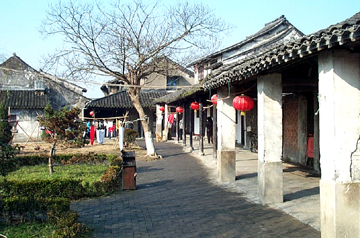





















































































































































































| | 
|
Xitang is in Jiashan County, Zhejiang Province. As early as the Spring and Autumn and Warring States Periods (770-221B.C.), it was a place of strategic importance on the boundary between Wu and Yue States, and it was thus known as the Bottom of Wu and the Corner of Yue. During the Yuan Dynasty (1271-1368), it developed into a prosperous town, and during the Ming and Qing Dynasties (1368-1911), it was known as an important town for commerce and handicrafts in South China. Today, Xitang is like an ancient piece of jade, glittering and translucent.
The area has a flat terrain, and the nine rivers that run through the town divide it into eight parts. Xitang is known for its bridges, lanes, and ceilinged corridors. There are 104 bridges of varied structure, all from the Ming and Qing Dynasties, some looking like rainbows over the river, and others like long flutes. Standing on one of these bridges and watching the boats through a round opening, one feels drawn into deep meditation on the past.
Many of the shops and houses in Xitang are built on the riversides. There are a total of 122 lanes, long and short, wide and narrow. The lanes are paved with stone planks, polished by the feet of pedestrians as well as hundreds of years of weathering. Together with the black-tiled houses along the roads, the polished stone planks bear witness to the town's long history.
Because of the rainy climate, local residents have invented their own style of ceilinged corridor. Each family puts a ceiling over the stone-plank road in front of its own house, and the ceilings connect with one another to form corridors, the longest being 1,300 meters. Nowadays, the ceilinged corridors are the main places for outdoor activities and attract countless tourists.
Xitang is also attractive because of the easygoing lifestyle that local residents have followed for thousands of years. Unlike the towns of Zhouzhuang and Wuzhen, Xitang is not a bustling place (see China Pictorial November 2001 and February 2002). People in the town live ordinary, peaceful lives. The elderly play with their grandchildren on bridges and in lanes, and women wash vegetables and clothes in the rivers running beside their houses. The simple lifestyle and peaceful atmosphere may have died out in those now commercialized ancient towns, but they fill every lane in Xitang. For tourists from modern metropolises, Xitang is a place to experience a feeling of simplicity and leisure.
An advisor from the UNESCO World Heritage Center spoke highly of Xitang after coming here. "Xitang is like the limpid and melodious music of a flute," he said. "People need to appreciate it with their heart."
| |
  |
|
|















